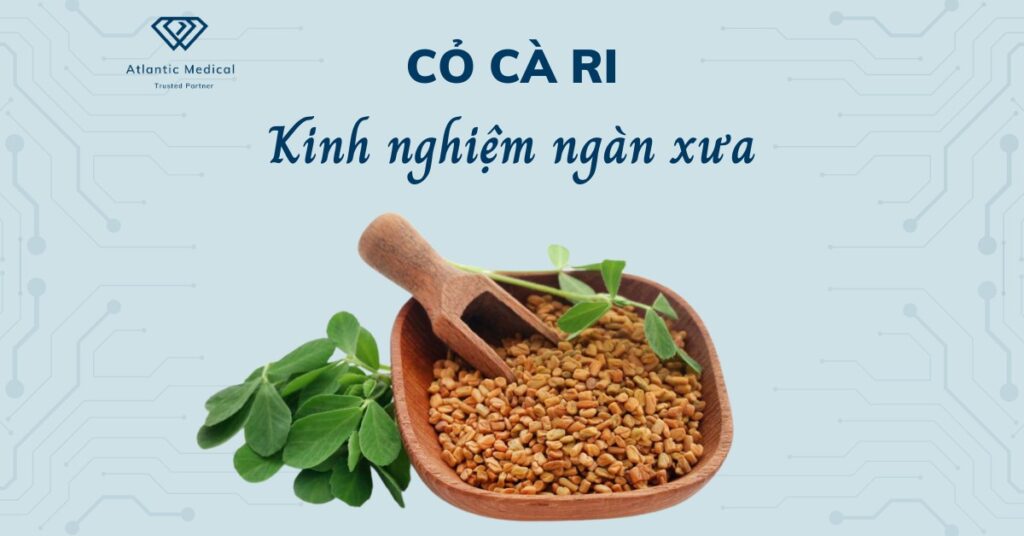

Với mong muôn tìm ra những hoạt chất từ tự nhiên, an toàn cho người sử dụng, y học hiện đại đã đào sâu nghiên cứu về các thảo dược dược sử dụng từ ngàn xưa. Và cỏ cà ri là một trong số loại thảo mộc được quan tâm nghiên cứu. Bài viết này, Atlantic Medical sẽ giúp bạn đọc tìm hiểu thêm về cỏ cà ri.

Trigonella foenum-graecum
Cỏ cà ri (hay còn gọi là hồ lô ba, khổ đậu) là một loại thảo mộc thuộc họ Đậu (Fabaceae), có tên khoa học là Trigonella foenum-graecum. Tên tiếng Anh của cỏ cà ri là Fenugreek hay Methi. Cây cỏ cà ri cao khoảng 60-90cm, có lá màu xanh, hoa nhỏ màu trắng, hạt màu nâu vàng hay hổ phách. Hạt cỏ cà ri hay được sử dụng trong việc làm các món ngâm, bột cà ri khô và nhão, và nói chung hay gặp trong các món ăn của người Ấn Độ.
Cỏ cà ri có nguồn gốc ở miền nam châu Âu và khu vực Địa Trung Hải. Nhưng hiện nay, cỏ cà ri cũng được trồng và phát triển ở nhiều nơi khác trên thế giới như miền Trung và Đông Nam Châu Âu, Ấn Độ, Tây Á và Bắc Phi.
Cỏ cà ri chứa 23–26% protein, 6–7% chất béo và 58% carbohydrate trong đó khoảng 25% là chất xơ. Về thành phần hóa học của cỏ cà ri cũng rất đa dạng, bao gồm:

Thành phần hoá học trong hạt cỏ cà ri
Từ xa xưa, người ta có thể sử dụng cỏ cà ri với nhiều mục đích khác nhau. Y học hiện đại cũng có nhiều nghiên cứu chỉ ra những tác dụng tiềm năng của cỏ cà ri:
Hai đánh giá hệ thống cho thấy khả năng kiểm soát đường huyết của cỏ cà ri. Và theo một đánh giá có hệ thống khác, cỏ cà ri có những tác dụng sau:
Cây cỏ cà ri có thể được sử dụng ở nhiều dạng khác nhau và tác dụng làm giảm đường huyết của cỏ cà ri có thể liên quan đến các cách dùng khác nhau như hạt thô, hạt được nấu chín, bột chiết xuất… Do đó, những nghiên cứu được thiết kế khoa học, chặt chẽ cần được thực hiện để có những thông tin cụ thể, chắc chắn về công dụng giảm đường huyết của cỏ cà ri.
Dựa trên đánh giá có hệ thống và phân tích tổng hợp, cỏ cà ri có tác dụng làm giảm cholesterol toàn phần, triglyceride, LDL-cholestrol (“cholesterol xấu”), đồng thời làm tăng HDL-cholestrol (“cholesterol tốt”) trong máu. Nhờ đó, cỏ cà ri có thể giúp cải thiện huyết áp, có thể làm giảm nguy cơ phát triển bệnh tim và cải thiện sức khỏe tim mạch.
Theo y văn xưa, cỏ cà ri được sử dụng để kích thích tiết sữa ở phụ nữ sau sinh. Một nghiên cứu hệ thống chỉ ra mối liên hệ giữa việc sử dụng cỏ cà ri và việc tăng tiết sữa không chắc chắn. Trong một nghiên cứu năm 2014, 25 phụ nữ mới sinh con đã uống 3 tách trà cỏ cà ri mỗi ngày trong 2 tuần và nhận thấy lượng sữa tăng lên trong những tuần đầu tiên. Một số sản phẩm lợi sữa trên thị trường hiện nay cũng có nguồn gốc từ cỏ cà ri.
Trong cỏ cà ri chứa một loai saponin steroid là diosgenin đã được chứng minh là có khả năng ngăn chặn các con đường truyền tín hiệu ủng hộ viêm, ngăn chặn sự phát triên của tế bào ung thư và kích hoạt tế bào ung thư tự chết theo chương trình – apoptosis.
Hội chứng buồng trứng đa nang (PCOS) là một tình trạng bệnh lý ảnh hưởng đến khả năng sinh sản của phụ nữ trưởng thành. Hội chứng buồng chứng đa năng có thể gây ra các vấn đề như khô hạn, kinh nguyệt không đều, u nang buồng trứng…. Trong một thử nghiệm lâm sàng nhỏ, 50 người tham gia nghiên cứu đã uống hai viên 500mg Furocyst (chiết xuất từ hạt cỏ cà ri) mỗi ngày x 90 ngày. Khi kết thúc thử nghiệm lâm sàng, 46% người tham gia có u nang buồng trứng nhỏ hơn và 36% không còn u nang nữa. Hơn nữa, 71% người tham gia nghiên cứu cho biết kinh nguyệt đều đặn, và 12% số người tham gia thử nghiệm có thai. Mặc dù những kết quả này rất hứa hẹn nhưng thử nghiệm này cỡ mẫu nhỏ, lại chưa được thiết kế có đối chứng với giả dược như một nghiên cứu RCT nên vẫn cần được nghiên cứu kỹ hơn để khẳng định chắc chắn tác dụng của cỏ cà ri với Hội chứng buồng trứng đa năng
Theo kết quả của một thử nghiệm lâm sàng nhỏ, những người mắc bệnh hen suyễn nhẹ có thể được hưởng lợi từ cò cà ri như một phương pháp điều trị bổ sung cùng thuốc chủ vận beta như albuterol. Trong thử nghiệm lâm sàng này, một số người tham gia nghiên cứu đã uống 10 ml siro cỏ cà ri với liều 2 lần/ngày x 4 tuần (Chiết xuất hạt cỏ cà ri được chế biến thành siro cùng với mật ong). Kết quả sau 4 tuần, so với nhóm dùng giả dược, những người dùng siro cỏ cà ri ghi nhận:
Cỏ cà ri có thể ngăn chặn cảm giác thèm ăn và tăng cảm giác no, điều này có thể hạn chế sự tăng cân. Trong một nghiên cứu thực hiện năm 2015, chín phụ nữ Hàn Quốc thừa cân đã uống trà thì là, cỏ cà ri hoặc trà giả dược trước bữa trưa. Những người uống trà cỏ cà ri cho biết cảm thấy ít đói hơn và no hơn. Tuy nhiên, trà không khiến người tham gia tiêu thụ ít hơn. Do hàm lượng chất xơ cao nên bột chiết xuất từ cây cỏ cà ri cũng có thể mang lại cảm giác no.
Cỏ cà ri có thể giúp tăng mức testosterone ở cả nam và nữ giới. Trong một nghiên cứu năm 2017, 50 nam tình nguyện viên đã chiết xuất hạt cỏ cà ri trong 12 tuần. Ngoài ra, khoảng 85% số người tham gia có số lượng tinh trùng tăng lên.
Không chỉ làm tăng testosterone ở nam giới, chiết xuất từ hạt cỏ cà ri – Libifem® – cũng đã chứng minh được công dụng tăng cường ham muốn và trải nghiệm tình dục ở nữ giới thông qua nghiên cứu lâm sàng có đối chứng trên 80 phụ nữ từ 20-49 tuổi. Libifem® cũng giúp làm giảm nhẹ các biểu hiện khó chịu của suy giảm nội tiết tố (đặc trưng bởi thời kỳ tiền mãn kinh, mãn kinh)
Cỏ cà ri từ lâu đã được sử dụng để giảm đau trong hệ thống y học cổ truyền. Các nhà nghiên cứu cho rằng các hợp chất gọi là alkaloid trong loại thảo dược này giúp ngăn chặn các thụ thể cảm giác cho phép não cảm nhận được cơn đau. Trong một nghiên cứu năm 2014, 51 phụ nữ bị đau bụng kinh đã uống viên bột hạt cỏ cà ri ba lần một ngày trong 3 ngày đầu tiên của kỳ kinh trong 2 tháng liên tiếp. Họ trải qua thời gian đau ngắn hơn và ít triệu chứng hơn giữa các tháng.
Cơ quan Quản lý Thực phẩm và Dược phẩm Hoa Kỳ (FDA) cho rằng cỏ cà có thể được coi là an toàn. Không có tác dụng phụ đáng kể nào với cỏ cà ri trong một nghiên cứu kéo dài 90 ngày ở những người mắc hội chứng buồng trứng đa nang (PCOS). Những người sử dụng Libifem® – chiết xuất từ cỏ cà ri được tiêu chuẩn hóa hàm lượng – trong các nghiên cứu cũng không ghi nhận bất cứ tác dụng phụ nào với cơ thể. Một số tác dụng không mong muốn được ghi nhận khi sử dụng cỏ cà ri từ xa xưa thường xảy ra trên đường tiêu hóa, bao gồm: đau bụng, tiêu chảy, chướng bụng, buồn nôn.
Phụ nữ mang thai nên tránh sử dụng cỏ cà ri vì nó có chứa các hợp chất có thể kích thích các cơn co thắt tử cung. Những người mắc bệnh mãn tính và phụ nữ đang cho con bú, nên nói chuyện với bác sĩ trước khi bắt đầu bổ sung cỏ cà ri hoặc tăng đáng kể lượng ăn vào trong chế độ ăn uống.
Nếu có bất kỳ thắc mắc nào, hãy nhấc máy liên hệ ngay với chúng tôi qua Hotline 0936.236.283 hoặc để lại câu hỏi tại đây để được các dược sĩ của Atlantic Medical giải đáp và tư vấn
Chúc quý vị cùng gia đình sức khoẻ dồi dào và cuộc sống chất lượng!